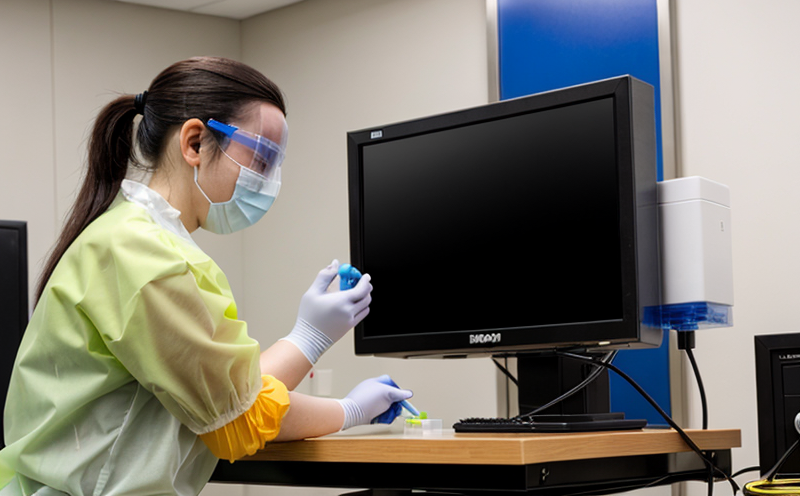In Vitro Biofilm Formation Testing on Implant Surfaces
In vitro biofilm formation testing represents a critical step in the development and evaluation of medical devices, especially those designed for implantation into biological tissues. This testing method simulates real-world conditions where bacterial colonies form on surfaces, thereby assessing the biocompatibility and potential for infection. Biofilms are complex communities of microorganisms that adhere to surfaces within physiological environments.
The process involves placing a medical device or its component parts in an environment designed to mimic body fluids, such as saline solutions containing glucose or other nutrients necessary for bacterial growth. The test subjects are exposed to various strains of bacteria, including clinically relevant species like Staphylococcus aureus and Escherichia coli. Over time, the biofilm develops on the device surface, which can then be analyzed under standardized protocols.
The significance of this testing lies in its ability to predict the likelihood of device-associated infections (DAIs) or implant failures due to bacterial colonization. By identifying problematic areas early in development, manufacturers can improve product design and reduce post-market complications. Compliance with regulatory requirements ensures that devices meet stringent safety standards before they reach clinical use.
Our laboratory specializes in conducting these tests using state-of-the-art equipment and methodologies compliant with relevant international standards such as ISO 10993-12, which provides specific guidance on biofilm testing. Our experienced team follows a rigorous protocol that includes precise control over environmental parameters like temperature, humidity, and nutrient concentration to ensure accurate results.
The outcome of this test is crucial for quality managers and compliance officers who need assurance regarding the biocompatibility of their products. For R&D engineers, it offers valuable insights into material selection and surface treatment strategies that enhance resistance against biofilm formation. Procurement teams can leverage these findings to select suppliers whose products meet stringent testing criteria.
Understanding the mechanisms behind biofilm development helps in optimizing device designs to minimize adverse interactions with biological tissues. This approach not only enhances patient safety but also contributes to longer-lasting implants and reduced healthcare costs associated with infections or reoperations.
Applied Standards
The testing methodology adheres closely to ISO 10993-12, which outlines the procedures for determining bacterial biofilm formation on medical devices. This international standard provides a framework that ensures consistency and reliability across different laboratories. Compliance with these guidelines is essential for ensuring accurate results that can be used effectively in regulatory submissions.
Other relevant standards include ISO 5832, which specifies requirements for titanium used in the production of surgical implants; ASTM F719, addressing stainless steel alloys suitable for orthopedic applications; and EN ISO 10993-4, dealing with cytotoxicity testing. These standards collectively guide our laboratory practices to maintain high standards of accuracy and precision.
Our team ensures that all tests are conducted in accordance with these standards, guaranteeing the validity of results for regulatory bodies worldwide. By adhering strictly to these guidelines, we provide clients with confidence that their products have been rigorously evaluated under controlled conditions.
Industry Applications
| Application Area | Description |
|---|---|
| Orthopedic Implants | Assessing resistance to bacterial colonization in hip and knee replacements. |
| Dental Implants | Evaluating the surface properties that prevent plaque formation around teeth. |
| Catheters and Tubings | Ensuring safe passage of fluids without facilitating biofilm growth. |
| Bioartificial Organs | Testing the durability and integrity of synthetic organs. |
| Stents | Identifying potential points of infection in cardiovascular devices. |
The ability to predict biofilm formation early in the design process allows manufacturers to address these challenges proactively. Our laboratory plays a vital role by providing detailed reports on test outcomes, highlighting areas requiring further attention or improvement.
International Acceptance and Recognition
The importance of biofilm formation testing in the medical device industry cannot be overstated. Regulatory bodies around the world recognize the significance of this testing method, making it a mandatory requirement for many types of implants and other devices intended for long-term use within biological systems.
For instance, the U.S. Food and Drug Administration (FDA) mandates compliance with ISO 10993-12 when evaluating orthopedic and dental implants. Similarly, European standards like EN ISO 10993-12 apply to similar devices manufactured for sale in EU member states.
Our laboratory's adherence to these globally recognized guidelines ensures that our clients' products meet the stringent requirements set forth by regulatory authorities. This recognition fosters trust among manufacturers, healthcare providers, and patients alike, contributing significantly to the overall safety and efficacy of medical devices entering the market.





